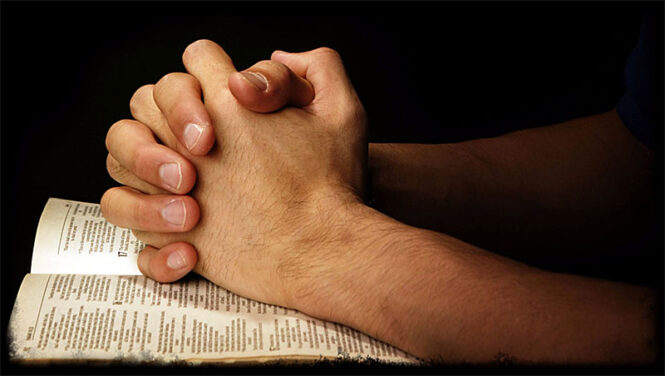
Boiled down to it’s most basic concept, prayer is simply a conversation between a follower of the Lord Jesus Christ and the One True God. Access to Father God is only through Jesus’ blood and His finished work of the Cross. How do we know this? Because Jesus Himself said:
Jesus said to him, “I am the way, the truth, and the life. No one comes to the Father except through Me.
John 14:7
Facts About Prayer
- Prayer is very personal, incredibly intimate, and is organic to a vital relationship with God.
- Prayer — along with God’s Word — is the spiritual lifeblood of every believer. Accept no substitutes because they are all counterfeits!
- The Bible records numerous accounts of God’s people praying to Him and how He then changed the course of a personal or national history in response to those prayers.
- Jesus modeled prayer — in priority, principle, and practice — for His disciples and the Bible contains quite a number of guidelines for effective prayer and promises for those who pray.
- Prayer invites the God of the Universe to intervene on someone’s behalf — our own or that of others — in what is happening here on earth
- Prayer is described in the Bible as incense in the presence of God:
Now when He had taken the scroll, the four living creatures and the twenty-four elders fell down before the Lamb, each having a harp, and golden bowls full of incense, which are the prayers of the saints.”
Revelation 5:8 - Generally speaking, according to Jesus in the gospels, we are supposed to pray to the Father in the name of Jesus. But there is nothing that says we cannot pray directly to Jesus or the Holy Spirit. After all, they are all One God.
Types of Prayer
- Salvation
- Surrendering to the lordship of Jesus Christ by grace through faith, believing that God raised Him from the dead. This is how someone is “born from above.”
- Repentance
- Repenting of and confessing our sins before God, receiving His mercy and forgiveness.
- Consecration
- Dedicating oneself or one’s nation, church, family, or possessions to the service of the Almighty.
- Supplication
- Asking God to:
- Do or provide something based upon promises in His Word
- Bless us in some form or fashion
- Meet our spiritual, mental, emotional, physical, financial, or family needs
- Give us guidance to know what course of action we should take
- Give us wisdom as to what to say and/or do in a difficult situation
- Resolve specific difficulties or challenges we may be facing
- Intercession
- The same as prayers of supplication, but for expressed on behalf of other people, nations, or organizations rather than ourselves.
- Thanksgiving
- Offering gratitude to God for the mighty works He has done or is doing in our lives and the lives of others.
- Worship
- Expressing praise and worship for Who God is and His character/attributes
- Imprecation
- These are prayers calling down God’s judgment upon the wicked or those who have wronged us.
Such prayers are frequently found in the Psalms of David as he struggled with the attacks of his enemies. This type of prayer, though, was superseded by Jesus’ command to “…love your enemies, bless those who curse you, do good to those who hate you, and pray for those who spitefully use you and persecute you” (see Matthew 5:44) Why? Because “…we do not wrestle against flesh and blood, but against principalities, against powers, against the rulers of the darkness of this age, against spiritual hosts of wickedness in the heavenly places.” (see Ephesians 6:12)
Submission & Confrontation
Prayer is both an act of submission and confrontation. Why do I say this? Because we are always submitting ourselves to the lordship of Jesus Christ while using our God-given authority to confront:
- The visible circumstances, ordering them to conform themselves to the Word of God
- The powers of darkness, ordering them to cease and desist their evil schemes
It is crucial that these two never get mixed up. We are never to submit to adverse circumstances or the evil plans/purposes/schemes of the powers of darkness — this leads to defeat — but resist them with the Word of God while submitted to the lordship of God, which is where our authority comes from.
We are never to demand anything of God — He is the LORD GOD, King of the Universe Who responds to our prayers of faith through His loving goodness and grace and His honoring His Word. We never approach God with any sense of entitlement because He is not our cosmic bellhop sent to wait on us hand and foot, catering to our whims and fleshly desires.
Misconceptions About Prayer
Getting our prayers answered depends on how “holy” or “spiritual” we are.
 Well, yes and no. Yes, our rebellious acts and sinful attitudes will cripple our prayer life. On the other hand, we don’t have to be perfect or achieve some state of enlightenment or level of “holiness” to have our prayers heard and answered affirmatively.
Well, yes and no. Yes, our rebellious acts and sinful attitudes will cripple our prayer life. On the other hand, we don’t have to be perfect or achieve some state of enlightenment or level of “holiness” to have our prayers heard and answered affirmatively.
God likes us better because we pray
Well, yes and no, again. Will we draw closer in our relationship to God by praying? Absolutely! But no, we cannot enhance our standing before God through prayer because, as we covered earlier in the previous article in this series, we are already as righteous (spotless, blameless) as we will ever be by the blood of Jesus and the finished work of the cross — we cannot enhance or detract from what Jesus has already accomplished!
Effective prayer is dependent upon our posture or apparel
 The historic stereotype is that we must be fully clothed or in our pajamas and kneel with our hands held or folded together and our head bowed either in a church or by our beds.
The historic stereotype is that we must be fully clothed or in our pajamas and kneel with our hands held or folded together and our head bowed either in a church or by our beds.
Actually, we can scripturally pray:
- In any position: standing, kneeling, sitting/squatting, supine (laying down, looking upward), prone (laying down, on our faces before God)
- While walking, running, crawling, swimming, climbing, flying (in a plane, of course, but especially while skydiving! 😀) or driving.
- With our hands clasped, raised to God — or stuck in our pockets, for all God cares!
- With our heads bowed, looking upward, or resting on a pillow.
- Wherever we are located: in a church, our homes, our cars, at work, out among nature, on city streets.
- Whether fully clothed, partially clothed, or buck naked.
In other words, God can hear us just fine regardless of our attire, posture, or physical surroundings!
Praying Aloud or Silently?
Scripturally speaking, prayer is generally spoken aloud except in those rare circumstances where we are not permitted to speak for whatever external reason (usually persecution of some kind).
God knows our thoughts and hearts, so speaking aloud is not a requirement for Him to hear us.
That being said, there are others who cannot read our thoughts and minds, specifically everyone who is not God.
Nowhere in the Bible can I find a recorded instance of a real person or persons praying silently. In my opinion, the modern “silent prayer” or “silent request” are devices used by:
- The immature to disguise their embarrassment over an issue, or;
- Someone’s feelings of inadequacy to pray aloud in the presence of others, or;
- Those who are trying to hide their sin(s) and are concealing them to avoid correction (more on this in Group #3 below)
Group #1: Ourselves
Our words are a powerful creative force in this earth because it is words which give our thoughts substance and clarity within our own minds. Bringing various concepts into mental focus requires us to express them in words and sentences which can be clearly understood by ourselves and others. Whenever we pray aloud, we are bringing our nebulous desires into focus and drawing a line in the sand, so to speak, indicating what we are making a stand on spiritually in our own minds.
Group #2: Satan & his Minions
Our psychopath enemy needs to know we and the persons we pray for are not going to be doormats for his schemes. While his servants can whisper thoughts into our minds, none of them can read our minds, so we cannot command Satan’s crew to leave us alone or stop doing something using our thoughts alone.
This is a major problem for many Christians. They do not realize this and persist in trying to resist temptation or overcome mental torment by “thinking them away.” When we look at Jesus’ example, nowhere in the Gospels did he “think” the powers of darkness away from Himself or others. He spoke to them, commanding them to leave.
And so we do, as well!
Group #3: Those We Want to Agree With Us in Prayer
A prayer of agreement is quite powerful because Jesus Himself said:
Again I say to you that if two of you agree on earth concerning anything that they ask, it will be done for them by My Father in heaven. For where two or three are gathered together in My name, I am there in the midst of them.
Matthew 18:19-20
and Solomon said:
Though one may be overpowered by another, two can withstand him.
Ecclesiastes 3:12
Agreement is the mechanism undergirding prayer chains and prayer meetings, when many people are praying in agreement, joining their faith in one accord as they pray to the Father over some matter(s). Many major moves of God in the earth have been brought to pass through such prayers!
But we cannot agree with someone unless we know what we are agreeing to. This produces accountability thus ensuring both their and our desires and prayers are righteous.
Case in point: a famous evangelist was working his way down a line of people who had responded to an altar call at one of his services, laying hands upon them and praying for each one individually. When he came to one man, the man stated that he had a silent request. The evangelist informed him that there was no way he was going to pray in agreement with a silent request, that he had to know what he was agreeing to. After a few moments of hesitation, the man blurted out that he was in love with a woman who was not his wife and he wanted to the evangelist to agree with his desire for God to kill his wife so he could marry the other woman. Obviously, the evangelist refused to pray in agreement with such a sinful and unscriptural desire!
So that about covers what prayer is. In my next installment, we’ll discuss why we pray.
Thanks for reading!

